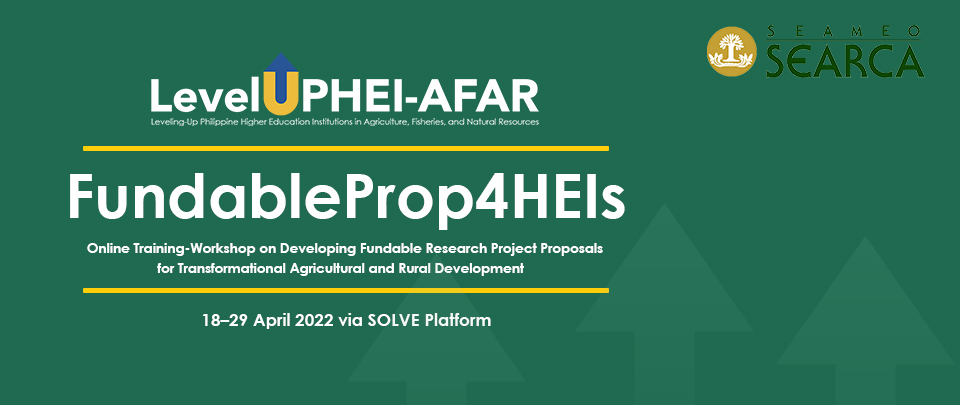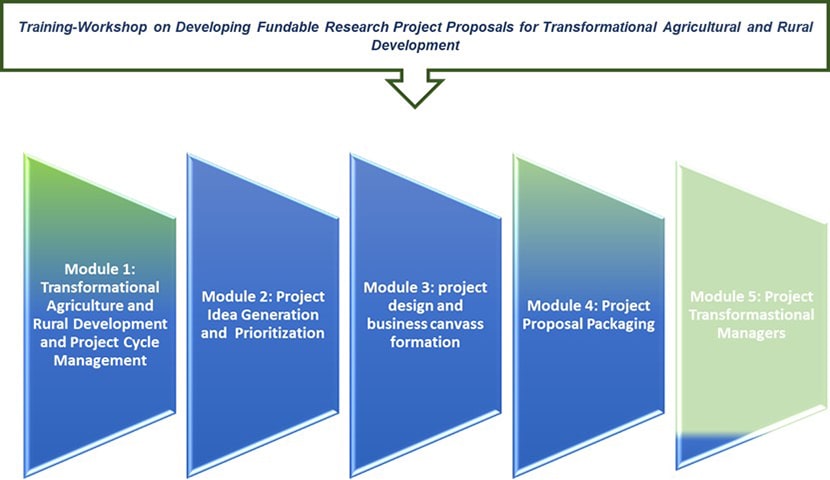
Background
ASEAN agriculture and rural development (ARD) is more challenged today than before. Four major drivers were identified in the ADB 2021: Asian Development Outlook. They are: (1) increasing food demand and shifting food choices towards animal products; (2) changing demographics as older farmworkers are becoming more prevalent and farmers' population are moving away from agriculture in favor of higher and more stable income in the manufacturing and service sectors; (3) high exposure to risks from climate variability and change; and (4) unsustainable farming practices, resulting into environmental damages and declining productivity.
A must response is innovation and transformation in agriculture and rural development. Innovation covers technologies, superior production technologies and improved postharvest and marketing practices that will bring prosperity to farmers and result into environmental sustainability. Innovation should lead into transformation where the subsistence-oriented and farm-centered practices are converted into more productive, commercialized, and environmentally sustainable food system.
The response of SEARCA is Accelerating Transformation Through Agricultural Innovation (ATTAIN) as the focus of its 11th Five-Year Plan (FY2020/2021-FY2024/2025). Generally, the Plan seeks to create the following outcomes: creation of a shift in the mindset of stakeholder; adoption of enabling policies and regulatory framework; access to innovative products and services and introduction of prosperous business model; increase of investments/financial support and promotion of food and nutrition security based on food choices. One approach to deliver the outcomes cited above is through transformational program/project development and management approach. Focusing on project planning, design and proposal packaging of fundable projects, this learning and development course is focused on transformational projects for ARD. Transformational projects, as defined by Caroline Heider (2016), are a set of interrelated activities geared to introduce and/or support "deep, systematic, and sustainable change with potential large-scale outcomes in agriculture and rural development research and development."
Course Objectives and Outcomes
Upon completing the learning activity, participants are expected to be able to:
- Describe the drivers and innovation and transformation perspective to agricultural and rural development paradigm
- Define the basic features of SEARCA's ATTAIN
- Describe transformational projects, including its life cycle
- Conduct situational analysis
- Apply MCUA in prioritizing project ideas
- Design a project using logical framework matrix and/or results framework and business canvas model
- Package a fundable research project proposal
- Prepare a Re-Entry Action Plan (REAP)
Course Structure
The course structure is built to answer the questions: are our projects promoting innovations and transformation in agriculture and rural development? How do we design and package them in fundable project proposal/s that are acceptable to stakeholders, in general, and to funding agencies, in particular?
The course will be delivered in five modules, as follows:

Figure 1. Course structure
| Module 1 | Transformational Agriculture and Rural Development and Project Cycle Management. Discussion of drivers and response to key challenges to ASEAN agriculture and rural development; SEARCA's strategic direction and response: "Accelerating Transformation Through Agricultural Innovation (ATTAIN);" and the project development and management approach. |
| Module 2 | Project Ideas Generation and Prioritization. Discourse on the key concepts and application of tools in situation analysis, generation, selection, and prioritization of project ideas. |
| Module 3 | Project Design and Business Canvas Formulation. Discussion of concepts and application of tools in project design preparation, such as the results framework (RF) and the logical framework matrix (LFM), and a business model canvass. |
| Module 4 | Project Proposal Packaging. Explanation of key concepts in project proposal packaging, key elements and desired feature, tips in project proposal writing, and requirements and project proposal format of selected funding agencies. |
| Module 5 | R&D Project Transformational Managers. The last module focuses on the role of Project Transformational Managers in managing the project life cycle toward innovation leading to transformation. |
Participants and Training Methodology
The training will have 40 participants, who are preferably junior faculty members or researchers of SUC-ACAP member institutions with sufficient relevant experience and knowledge to understand training content and benefit from the training as much as possible.
It is designed to reinforce existing knowledge and practices on project proposal packaging, focusing on innovation and transformation of the agriculture and rural development sector through innovation. It will facilitate exchange of ideas and experiences and promote networking among the different research and development institutes (RDIs) of HEIs. It will be delivered under an online learning environment, with 10 synchronous sessions. Against that background, it combines inputs from resource persons and practical examples to build the knowledge, skills, attitudes, and habits of the participants in their endeavor to package their own fundable project proposal.
A pre- and post-test exercise will be conducted to gauge the learning of the participants in the training program. To enable SEARCA to track the applications of the skills acquired or polished in the training program, participants will be required to formulate a Re-entry Action Plan (REAP).
Program Duration and Platform
The Program will be conducted online via the SEARCA Online Learning and Virtual Engagements (SOLVE) Platform from 18-29 April 2022.
Program Fees
Applicants should come from invited SUC-ACAP members and are to apply via the Commission on Higher Education (CHED)-funded project of SEARCA titled Leveling-Up Philippine Higher Education Institutions in Agriculture, Fisheries, and Natural Resources (LevelUPHEI AFAR). Successful applicants will be awarded a grant to participate in this Training-Workshop on Developing Fundable Research Project Proposals for Transformational Agricultural and Rural Development.